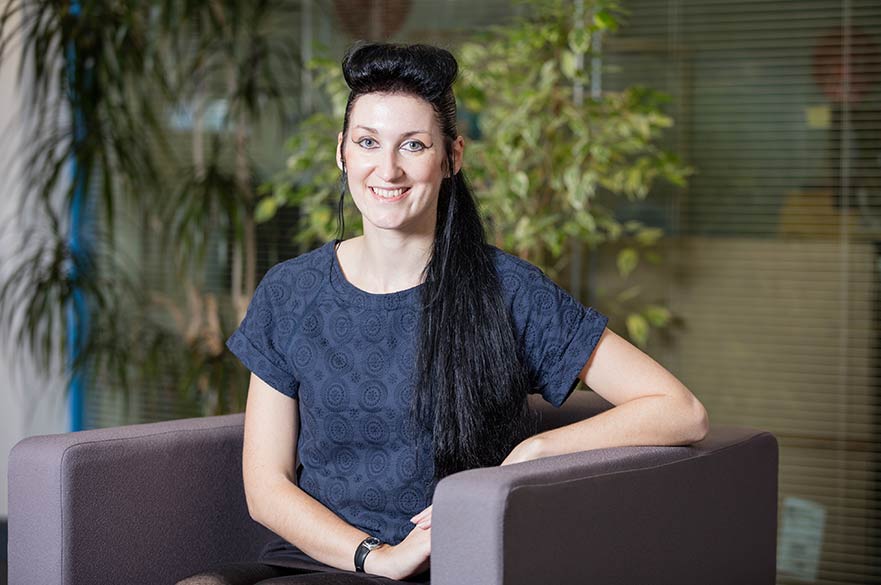An interview with Jenni Ramone
Dr Jenni Ramone, Associate Professor in English gives us an insight into her subject and English at NTU.

Dr Jenni Ramone is an Associate Professor in English.
While the texts we read and the way we teach is constantly evolving, one thing about English Literature hasn’t changed, and I doubt it ever will: it’s always been a subject where students are thrown in at the deep end, and that’s why it’s so exciting. Straight away, you’re exposed to surprises, questions, and challenging ideas.
That exposure’s even more pronounced than when students come from an environment where they’ve been expected to read in a certain way. There’s a kind of rigidity sometimes: this idea that there’s only one way to interpret a text, and that if you miss something, it’s because there’s something wrong with you. That approach can affect people’s confidence — and sometimes, it can stop them reading altogether. It can drain the joy out of literature.
That’s why our ethos is deliberately different. We’re more open here, and we encourage our students to develop their own ideas. We want them to interpret texts in a way that they feel is important. It’s less about us guiding or controlling those interpretations, and more about placing the students’ ideas and priorities at the centre of what we do; to develop them as careful, critical thinkers, who can communicate their ideas in a compelling way.
It’s not the traditional-style teacher-student relationship here at NTU. We have our expertise as academics of course — but we focus on placing our students at the centre of the discussion and enabling them to take control. At times, we’re less teachers and more co-collaborators. We want our students to surprise us with their own ideas; not to repeat what we’ve told them in lectures, but to come up with things we haven’t considered ourselves through new readings. It’s a creative partnership, and whilst they can feel comfortable in our expertise, there’s an onus on them to bring questions, concepts and arguments; to be bold, to take risks, and to write passionately, as opposed to just safely.
The world’s changing. Through things like the Black Lives Matter and #Metoo movements, through climate change and environmental issues, we’re meeting an amazing generation of politically energised students who understand their obligation to speak up, and their ability to make a real difference. That’s where being a careful and considered critic — a precision communicator — really comes to the fore. Now more than ever, the world needs creative and critical thinkers who can get to the heart of an issue, and who can contextually interpret what they’re seeing all around them in their workplaces, their relationships and their communities. To me, that’s the true value of an English degree. We want our students to feel confident, and while a lot of them don’t necessarily feel that way when they arrive at NTU, we give them the encouragement and opportunities to really blossom as well-informed readers and commentators. That doesn’t just come through the traditional literature modules — it comes through their placements and the professional roles they inhabit, and the podcasts and journals they co-produce. Every aspect of the course highlights the place their subject has in the real world, and that’s vital in English. They read lots too, but they’re not isolated.
I want my students to feel at home here. I’ve got such happy memories of my own undergraduate degree, and one particular seminar group, which took place in our lecturer’s office — she had a kettle and herbal teas, she’d invite us to help ourselves, and then we’d sit around on higgledy-piggledy chairs discussing these amazing texts. She listened to us, and that’s what people need to build up their knowledge and confidence. They have to feel like they’re being heard, and that they’re valuable — that what they think and say truly matters. I’ve always tried to replicate that kind of environment.
We’re a community here, and I feel that’s what makes English at NTU so special. It’s not a relationship that ends with graduation. A former student of mine got in touch recently because he’d read a book that reminded him of a module he’d taken with me. He left the University four years ago, but this book really inspired him — it took him right back to his time here, and I was so happy that he’d taken the time to approach me for more recommendations. That kind of thing that happens all the time, and it’s what makes us a place to call home.
Find out more
Read Jenni's staff profile and learn more about English, Linguistics and Creative Writing at NTU.